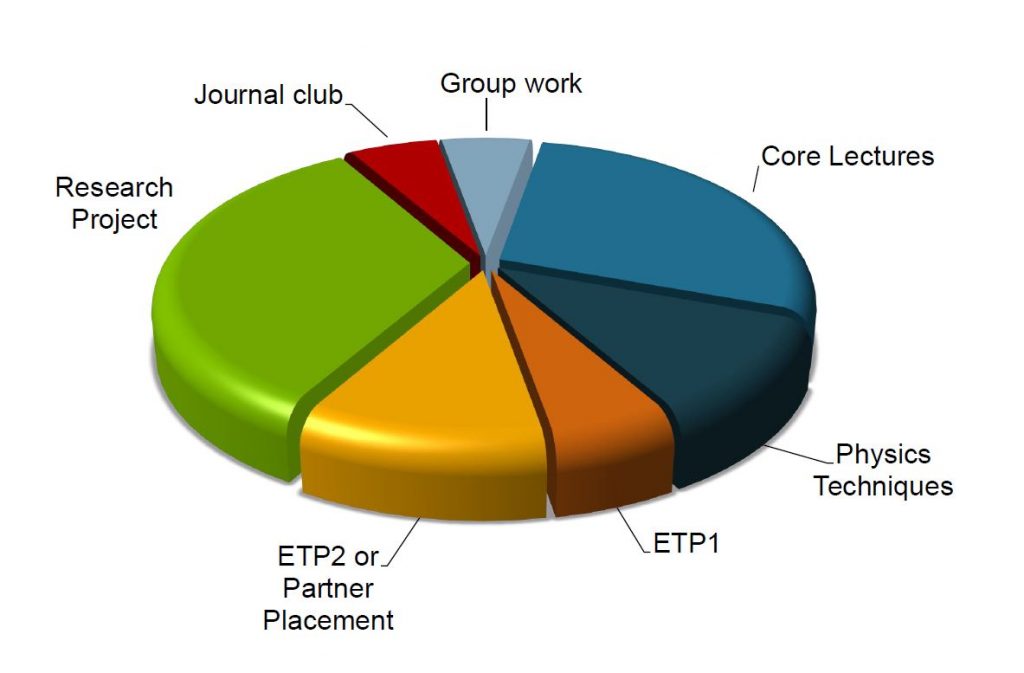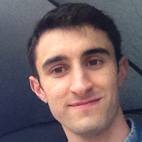CDT-CMP is a 4-year programme with a taught first year, which aims to help students understand the breadth of the condensed matter physics research area. Students are not expected to have chosen a PhD project before they start the programme but will chose their project during the Spring of year 1. The first year will include a Research Project or Research Placement which will usually extend into the PhD project in years 2 to 4. The PhD project will be either at Bath or Bristol.
Lewis, CDT-CMP student |
Year 1
In the first year of the training programme there are a series of lecture courses, practical techniques training courses, short Exploratory Training Projects (ETPs) and an extended Research Project or Research Placement.

These components of the course are explained here:
Core Lecture courses
The units are divided into three teaching blocks, each with an overarching theme.Block A – The Physics of Novel Materials (Novel electronic materials; Superconductivity and quantum magnetism; Charge, transport and thermodynamics; Applied magnetism and devices, e.g. graphene, high-temperature superconductivity).
Block B – Device Fabrication and Characterisation (Materials chemistry and synthesis; Materials and device modelling).
Block C – Theoretical Modelling and Simulation (Many body theory and the theory of condensed matter; Modelling materials and devices on length scales, e.g. application of many body theory to real materials through computational projects and worked examples).
Physics Techniques modules
These are a mixture of lectures and/or practical training – e.g. Laboratory-based skills for making precision electronic measurements; Skills in using spectroscopic probes (Raman, STM); Theoretical modelling and simulation of materials and devices; Neutron and X-rays at large facilities.
Exploratory Training Projects (ETPs)
There will be two, eight-week long laboratory- and theory-based assignments designed to increase students’ awareness of the breadth of the field. The first ETP of the year is mandatory for all students, the second ETP is optional and can be replaced with the Research Placement.
Research Project
This will expose students to the rigours of a professional research environment at a very early stage, and give them the opportunity to sample life within an active university research group. Many students will continue to work in the same research area as this project for their PhD, however they will also have the possibility to switch to another project at the beginning of the second year. The Research Project is usually chosen in the Spring of the first year.
Research Placement
Students have the opportunity to undertake a short Placement of about 6 weeks. It is intended to expose students to the rigours of a professional research environment outside of Bristol/Bath, and to give them the opportunity to sample life within an industrial company, a large-scale facility or an overseas research laboratory. These placements will take place with one of our Partners.
Journal Club
Understanding and appreciating the current literature is a key element of scientific research. The aim of this unit is to foster a scholarly atmosphere where students are routinely reading, understanding and criticising research papers at the forefront of the centre’s research fields.
Group Problem Solving
Students will work in groups to develop a solution to current research or technical problems. Problems will be selected from a subset of those posed by our partners and other members of the Centre for Doctoral Training.
Years 2 to 4
This is the research part of the degree where students are embedded in a research group at either Bristol or Bath. In most cases the year 1 Research Project will extend into the full PhD project which will continue in years 2 to 4. For some students there will be the opportunity to collaborate with an industrial, academic or large facility partner (in the UK, Europe, Japan, USA) and perform the research project in an external laboratory or workplace.
Students will continue to benefit from training and development offered by the CDT-CMP, to attend colloquia, and continue to participate in our Annual Conference.

